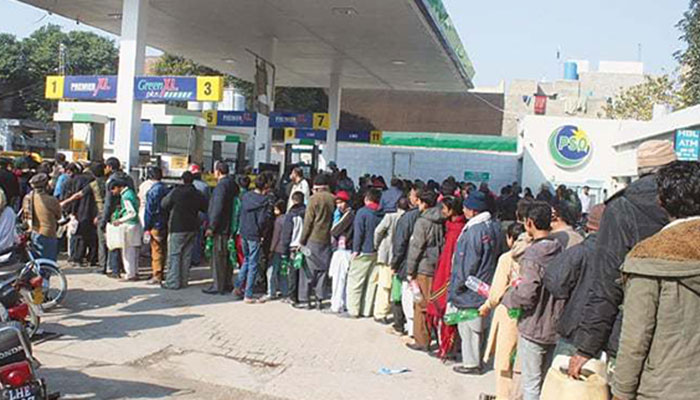A severe crisis seems to be brewing as several fuel stations in Karachi, Lahore, Islamabad, Peshawar, and Quetta, among other areas, have closed shop owing to lack of supply and high demand.
Moreover, at the handful of fuel stations that are operating, long queues of commuters can be seen as people rush to acquire the commodity before it runs out completely.
Tourists who had thronged Gilgit-Baltistan and surrounding areas were reported stranded owing to the fuel shortage as well as the halt in public transport vehicles, locals said.
Fuel stations across the country shut down after supply was halted when the All Pakistan Oil Tankers Association (APOTA) went on a strike against the government’s ‘unfair’ practices.
On Monday, APOTA announced to go on a countrywide strike in protest of the safety rules imposed by the Oil and Gas Regulatory Authority (OGRA). The association members decided not to supply oil to fuel stations in protest for an indefinite period until their demands were met.
OGRA said it would start checking the tankers being used by oil marketing companies, as it was feared many oil tankers did not fulfill the quality criteria.
The regulator decided to implement the safety rules after the horrific incident in Ahmedpur East, which claimed lives of over 200 people.
APOTA has refused to comply with government orders pertaining to the use of substandard and unsafe vehicles for the transportation of fuel.
Negotiations succeed
The third day of negotiations between the government and APOTA proved successful, sources informed on Wednesday, as the association agreed to lift the strike.
However, a forman announcement is yet to be made.
The government’s side was headed by Petroleum Secretary Sikandar Sultan Raja while APOTA Chairman Yousaf Shawani was heading the other side.
Before the start of negotiations, OGRA Chairperson Uzma Adil Khan said that “they’re holding us hostage and blackmailing us”.
Proceeding into the meeting, Shahwani said the unjust action against oil tankers must end.
Sources said the two sides agreed to increase the freight rate of oil tankers and to resolve all other issues within 15 days.
Meanwhile, Railways Minister Khawaja Saad Rafique has offered to transport fuel across the country on cargo trains. Rafique spoke over the phone with Petroleum Minister Shahid Khaqan Abbasi and offered to utilise the rail network for transportation of fuel.
The minister also tasked Railways CEO Javed Anwar to contact PSO to take the matter further.
Earlier, CNG stations decided to close down across Sindh for the next 24 hours. However, All Pakistan CNG Association chairman Ghaus Paracha said Sui Southern Gas Company will be opening all the CNG stations across the country shortly.

Bahawalpur tragedy
The oil tankers’ owners faced scrutiny after the tragic incident in Bahawalpur on June 25, which claimed the lives of over 200 people.
The incident occurred when an oil tanker, which had overturned, exploded near Ahmedpur East Tehsil in Bahawalpur. The deceased included villagers and passers-by, who had gathered to collect oil leaking from the tanker.
“We do not accept OGRA regulation; its policy is wrong,” said Shahwani while speaking to Geo News.
“We do not accept increasing the number of oil tankers’ axles,” he said, adding that they didn’t set fire to the oil tanker in Bahawalpur; it was the people present over there.
Shahwani warned that if their demands were not met then the strike would not end. He said that they had a two-axle agreement with National Highway Authority, which was in place for the last ten years.
‘Blackmailing authorities’
Speaking to media, OGRA spokesman Imran Ghaznavi accused the oil tankers’ owners of blackmailing the authorities. “We will not allow it. The owners of oil tankers should come and talk to us.”
He requested the APOTA representatives to not play with the lives of people, adding that they suspected oil marketing companies were behind the strike.
Ghaznavi said the companies involved in the crisis would be exposed.
In January 2015, the country witnessed a severe shortage of fuel after fuel stations ran out of the commodity owing to a surge in demand and panic buying.
The petroleum ministry, OGRA and finance ministry had all blamed each other for the breakdown in the oil supply chain.





